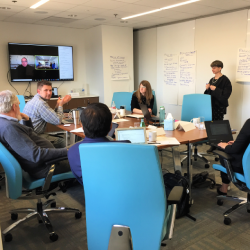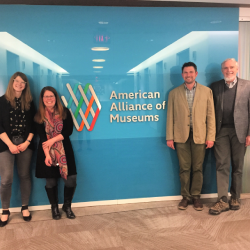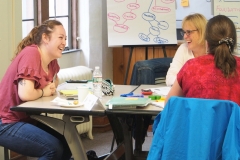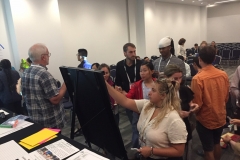Nurturing the Vibrant Community of Ecologists
Our community continued to grow in 2019. The membership of nearly 8,000 researchers, educators, consultants, students, practitioners, writers, and leaders continued to be among the most dynamic organizations in science. And to support that energy, we sought constantly to find new ways to contribute to our membership’s aspirations — scientifically, professionally, socially — and be the professional home that they deserve.
Professional Development for Ecologists
ESA isn’t just a society of researchers — it’s a professional organization for people who happen to be ecologists. Like any good professional association, we contribute programs designed to build members’ skills as professionals as well as scientists. This included everything from Career Central at the Annual Meeting to initiating a series of webinars on everything from data skills to publishing.
Our unique certification program took a major step forward in 2019. While our Board of Professional Certification was pleased to issue 115 certifications for the year, a special ad hoc committee and staff were hard at work to find suitable refinements to the program so that it can continue to provide credentials that meet the growing need for trained, vetted ecologists. Big things are in store!
The Sustaining Biological Infrastructure Training Initiative continued to provide directors of labs, collections, field stations, and digital data resources with the fundraising, communication, and strategic planning skills they need to ensure their project’s success. In the past year, we held two Strategies for Success courses, one mini-course in conjunction with the Organization of Biological Field Stations Annual Meeting, and one workshop at the ESA Annual Meeting, training 84 scientists in total. Check out the SBI website for future training opportunities in 2020!
A follow-up meeting to the 2016 FutureProofing Natural History Collections Workshop took place on March 28, 2019 at the American Alliance for Museums in Crystal City, VA. Participants reflected on achievements since the original workshop, discussed methods of overcoming real and potential barriers to maintaining and growing collections, and identified strategies, situations, and tools that help collections leaders implement innovative approaches to sustaining collections and developing new business models.
 |
 |
Supporting Ecology Education
The final year of the decade was a banner year for ESA and our support for ecology education, headlined by the endorsement of the new Four Dimensional Ecology Education Framework (4DEE) by the Governing Board following the excellent work of the Committee on Diversity and Education. These resources were created to help educators orient toward the framework while the CDE builds more resources on implementation:
- Blog post: ESA Endorses Four-Dimensional Ecology Education Framework
- Webinar: ESA’s Four Dimensional Framework for Ecology Education (4DEE): Opportunities and Challenges
- A commentary, by Klemow, K. Berkowitz, A., Cid, C., Middendorf, G. Improving ecological education through a four‐dimensional framework Front Ecol Environ 2019; 17( 2): 71– 71 https://doi.org/10.1002/fee.2013.
- An article by Prevost, L., Sorensen, A. E., Doherty, J. H., Ebert‐May, D., and Pohlad, B.. 2019. 4DEE—What’s Next? Designing Instruction and Assessing Student Learning. Bull Ecol Soc m 100( 3):e01552 https://doi.org/10.1002/bes2.1552.
We additionally hosted the 5th Life Discovery – Doing Science Education Conference under the theme of Microbiomes to Ecosystems: Evolution and Biodiversity across Scale, Space, and Time. Held in Gainesville, Florida, in March, the conference offered three field trips, 19 short presentations; ten workshops, 18 education share fair roundtable presentations, and a facilitated networking session with seven topics and drew 98 participants across the US.
ESA also recognized seven faculty members who completed the ESA-QUBES Data Explorers Faculty Mentoring Network requirements as ESA Education Scholars. Participants were supported by two peer mentors who had participated in a previous FMN. The Data Explorers FMN was supported by a grant from the National Science Foundation and ran virtually over the Spring 2019 semester in partnership with Quantitative Undergraduate Biology and Education Synthesis (QUBES) program.
The Next Generation
ESA launched its new partnership with the National Park Service to manage the Future Park Leaders of Emerging Change (FPL) program in 2019. The FPL program supports paid internships to upper level undergraduate and graduate students to work in a national park for 12 weeks on projects related to natural and cultural resource conservation, park infrastructure, policy development, interpretation and education, and other management challenges arising from global drivers of environmental change.

